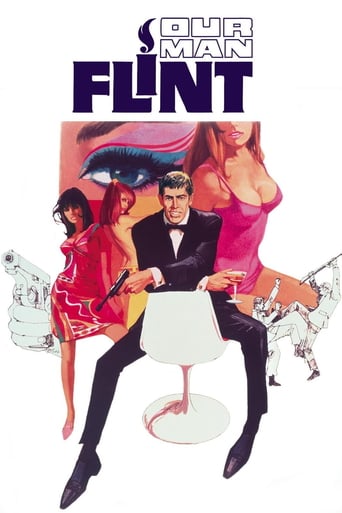

A bit overrated, but still an amazing film
... View MoreHow wonderful it is to see this fine actress carry a film and carry it so beautifully.
... View MoreClose shines in drama with strong language, adult themes.
... View MoreOne of the film's great tricks is that, for a time, you think it will go down a rabbit hole of unrealistic glorification.
... View MoreJames Coburn found elusive stardom and top billing with Our Man Flint and its sequel film In Like Flint. He becomes the American version of James Bond and has to reluctantly save the world.He only gets his heart into the assignment after someone tries to kill him. Up to that point he's been ducking the assignment until a poison dart is shot at him and strikes Lee J. Cobb, nearly doing Cobb in.Science has run amuck with a group of scientists getting together and creating a climate control device. Their demands on the governments of the world, lay down your arms and submit to our benevolent rule as we know best. They've even created an island paradise and on first glance it looks like a place Coburn could love. The only problem is he likes pleasures unregulated, no one will tell him when and how much.Flint is an American James Bond, unlike Bond who leaves his indulgences when duty calls, Flint has to be coaxed. Lee J. Cobb dislikes the coaxing and Flint's undisciplined ways. Cobb overacts outrageously with tongue firmly in cheek as Derek Flint's harassed superior.Coburn too shows a wry sense of humor in his portrayal. In fact joining in the furniture chewing is Edward Mulhare, the head bad guy who just doesn't like sharing his black book, his "pleasure giving female units" with Flint.Not as stylish as the James Bond series, but still lots of fun.
... View MoreAlthough "Our Man Flint" was billed as a spoof,it was too serious for its own good. When I hear "spoof,' I expect to see some really outrageous things -- taking conventions from the genre and then going over-the-top. Maxwell Smart comes to mind.But OMF lacked that sense of playfulness and fun. Sure, it had some silly touches (Z.O.W.I.E., the actor portraying Dr. Wu) but I think the movie would have benefited from developing them further; as it is, they were basically flat one-liners. An 83-function cigar lighter is a nifty concept -- but Flint could have/should have availed himself of many more of those functions. And the "villains" were on the weak side; more flamboyant characters (use the *original* Dr. Loveless as a reference point) could have certainly livened things up."Our Man Flint" is not a horrible movie by any stretch; just missing a certain "zing" factor.
... View MoreSuper smooth freelance agent and dapper playboy millionaire Derek Flint (the always amiable and engaging James Coburn on top of his game) has to stop the nefarious criminal organization Galaxy from taking over the Earth through manipulating the weather. Director Daniel Mann, working from a hip and witty script by Hal Fimberg and Ben Starr, relates the eventful and hugely entertaining story at a snappy pace, maintains a winningly sly tongue-in-cheek tone throughout, and stages the fight scenes with genuine aplomb. Coburn's supremely cool, assured, and charismatic presence really keeps the picture humming throughout; he receives sturdy support from Lee J. Cobb as Flint's huffy boss Cramden, the gorgeous Gila Golan as lovely, yet lethal femme fatale Gila, Edward Mulhare as suave killer Malcom Rodney, and Benson Fong as evil scientist Dr. Schneider. The bevy of beautiful gals (Shelby Grant, Sigrid Valdis, Gianna Serra, and Helen Funai are all quite foxy and sexy as Flint's live-in distaff companions), Jerry Goldsmith's wonderfully lush and groovy swinging score, a neat array of funky gadgets (Flint's watch and lighter are both amazing), Daniel L. Fapp's vibrant widescreen cinematography, the sharp dialogue (favorite line: "An anti-American eagle; it's diabolical"), and the lively and exciting climax all further enhance the gloriously kitschy fun. A total blast.
... View MoreHaving read all the James Bond novels by Britain's Ian Fleming -- most of which were written in the 1950s long before the watershed 1960s era of sexual promiscuity, recreational drug use, proud individuality, rock and roll, anti-establishment protest, etc. -- I think that tracing the evolution of the original Bond to the outrageous Derek Flint in so few years might actually make a fascinating sociological Ph.D. thesis. In each of Fleming's novels, the 6', 170-lb. Bond was little more than a glorified policeman (as Dr. No so aptly described him) who used thought, skill, courage, and gritty determination to plausibly accomplish his mission and survive torture, all while falling for a single woman who usually died in the end. In his way, he was practically monogamous and faithful, in addition to being deadly serious. Fleming picked the name James Bond to connote a bland, rather unremarkable cog in the wheel of Her Majesty's Secret Service, albeit with a license to kill. The first Bond film, "Dr. No", remained fairly faithful to the novel, except that actor Sean Connery oozed an almost animalistic and sexual charisma which Fleming found inappropriate. By the second film, "To Russia With Love", Bond was becoming a swashbuckler capable of fighting off a dozen men in hand-to-hand combat without getting winded. In subsequent films over the next 40 years, Bond became more and more sexually promiscuous while performing increasingly implausible feats of daring-do, all while the plots and gadgets and bad guys became more and more outlandish. But in the mid-1960s, when "Our Man Flint" was released, the cinematic Bond was still largely grounded in reality, and his tongue was only occasionally in his cheek. Flint, on the other hand, wasn't so much a parody of Bond as the quintessential expression of what so many male, American Baby Boomers secretly wanted to be: adored by harems of gorgeous young women; multi-millionaires without having to work for it; quick, witty, and gifted with devastatingly high IQs; super-athletes and sportsmen; ultra-skilled in all forms of hand-to-hand combat without losing a fight or getting hurt; Renaissance men equally at home amid fine art, fine wine, eclectic music, sophisticated gadgets, Zen masters, foreign cultures, and powerful weapons. In other words, the comparatively "boring, nose-to-the-grindstone Bond" of the 1950s had, by the mid-1960s, become the "ultra-fantastic fantasy figure of Flint". One of the reasons Bond (in the novels) smoked so many cigarettes and didn't care, was that he was convinced he was going to be killed soon; his body was already covered with scars. Flint, on the other hand, seems to feel he's going to live forever in his prime -- exactly what many Baby Boomers wanted (and still want, in some cases). The Bond of the novels was a former naval commander and dedicated government agent almost 24/7; Flint is a playboy who probably contributes articles to "Playboy" and saves the world when it suits him because he unexpectedly has a few hours to kill. In many respects, Bond and Flint are opposites, just as the mid-1950s and mid-1960s were. Each character speaks volumes about the societies in which they first appeared. On a lighter note, I found "Our Man Flint" a hysterical hoot led by the outrageous, scenery-chewing James Coburn, and I recommend the movie to those who want to take a lighthearted look at the "pop Sixties" while chuckling and shaking their heads at the silliness.
... View More